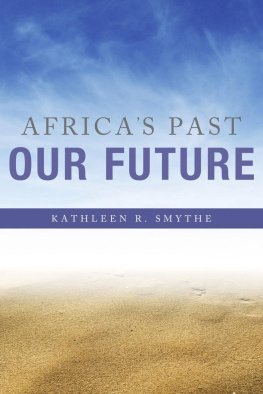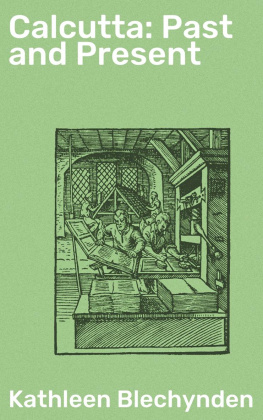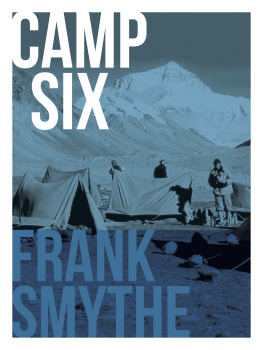This book is a publication of
Indiana University Press
Office of Scholarly Publishing
Herman B Wells Library 350
1320 East 10th Street
Bloomington, Indiana 47405 USA
iupress.indiana.edu
2015 by Kathleen R. Smythe
All rights reserved
No part of this book may be reproduced or utilized in any form or by any means, electronic or mechanical, including photocopying and recording, or by any information storage and retrieval system, without permission in writing from the publisher. The Association of American University Presses Resolution on Permissions constitutes the only exception to this prohibition.

The paper used in this publication meets the minimum requirements of the American National Standard for Information SciencesPermanence of Paper for Printed Library Materials, ANSI Z39.48-1992.
Manufactured in the United States of America
Library of Congress Cataloging-in-Publication Data
Smythe, Kathleen R., [date] author.
Africas past, our future / Kathleen R. Smythe.
pages cm
Includes bibliographical references and index.
ISBN 978-0-253-01647-8 (cl : alk. paper) ISBN 978-0-253-01655-3 (pb : alk. paper) ISBN 978-0-253-01661-4 (eb) 1. AfricaHistory. 2. AfricaCivilization. 3. AfricaSocial life and customs. I. Title.
DT20.S57 2015
2015012043
1 2 3 4 5 20 19 18 17 16 15
Acknowledgments
THIS BOOK IS the result of years of intellectual and spiritual exploration at Xavier University, where I have made my academic home since 1997. Students in my African history survey pushed me to answer the question Why should a student in Cincinnati, Ohio, study African history? Their embrace of African history and the perspective that it brings not only to the continents history but also to our own history helped to launch the project and continued to make it feel important and worthwhile. I am particularly thankful to several classes of students that helped to shape the manuscript with their sincere interest and candor.
Xaviers Jesuit mission provided the spiritual and personal space to explore my deep-seated interest in sustainability and to bring personal and vocational responses into dialogue with those engaged in similar and related quests. A sabbatical in the fall of 2012 provided the space and time to finalize the manuscript for external review. The university also funded attendance at several conferences, where I presented chapters from the book and gained opportunities to have some of the material published in advance of the full manuscript.
The intellectual flexibility, curiosity, desire, and talent for merging teaching, research, and service, together with the support of my departmental colleagues, chairs, other colleagues, and staff at Xavier, contributed, wittingly or not, to this project as well. A senior colleague, John Fairfield, is both an excellent teacher and a fine example of a curious scholar. He set a high bar in the classroom and in terms of broad, engaged scholarship. It is his embodiment of these traits that laid the foundation that helped me to consider undertaking this kind of book. More than ten years ago, I shared some survey class material with colleagues Julia OHara and Brandon LaRocque and upper-class material with Christine Anderson and in so doing began to see the wider relevance for much of the material in the survey course. OHara, a Latin Americanist and gentle colleague, has been a constant source of conversation and insight about the ways our fields intersect and diverge. About ten years ago, ethicist James Buchanan asked me to guest teach in his globalization class. Doing so required learning more about how American and European scholars talked about globalization and launched an investigation into economics that still absorbs me to this day. I am grateful for his initial invitation and support. I have learned from him, economist Jamal Abu-Rashed, theologian Gillian Ahlgren, and political scientist Anas Malik in several different iterations of the course. Theologian Marie Giblin and I taught a faculty workshop on Africa and globalization and then worked on a research project in Tanzania on development aid that opened up a related line of inquiry around development aid and service learning. I led two academic service learning semesters in Ghana and benefited from the experience, questions, and support of director Irene Hodgson; my co-trip leader, biologist Jen Robbins; and the faculty on the Advisory Committee, particularly economist Amit Sen, Anas Malik, theologian Walker Gollar, and historians Christine Anderson and Julia OHara. The students on both trips allowed me to relive my first immersion experience in Africa and to be a guide for them on their transformative experience. How U.S. citizens, government, non-governmental organizations, and corporations impact and relate to Africa remains a deep and vexing question.
I had the privilege of working closely and becoming friends with theologian Elizabeth Groppe on a curricular program for three years and learned much from her about engaged scholarship and engaged living. I am grateful for the high bar she has set both personally and professionally. I also worked closely with Dave Lococo, Director of Physical Plant, as we co-chaired Xaviers Sustainability Committee for four years. The work we did together building a sustainability program deeply influenced the way I think about a university campus, what can and should be learned there, and from whom. Dave embodies transdisciplinary learning; he is an engineer with a theologians questions.
As the project developed, historian Brandon Lundys interest in an overview article derived from the text helped to boost my confidence, and reviewers comments helped to sharpen my arguments. Historian Nicholas Creary attended a paper presentation of the content from and asked to use it and the other extant chapter in his classes and has been doing so for a number of years. His response and that of his students provided me with a concrete sense that I was writing for a wider audience and that I had colleagues who would be able to use the material. Geographer Heidi Frontani and I reconnected and discussed our research projects and found much overlap in our teaching and writing. Her contributions to two chapters in the book are integral to its final shape, and I appreciate both her work here and her friendship. Another historian colleague and friend, Jan Shetler, has been a keen supporter of the project as well. One of the roots of the book was an article I wrote on teaching Africa in world history. Jan made useful suggestions on a draft of that article, helping to shape several of the chapters herein. She read an earlier version of the manuscript, guiding it into a much better text than it would have been otherwise. She assigned the unpublished manuscript in her African history class and her students made very thoughtful and sometimes provocative comments on an almost final version of the manuscript. I appreciate their and her engagement with the text and its ideas and philosophy.
I am grateful to the many friends, acquaintances, and writers who read parts of the manuscript, heard parts of it in sermons, or used parts of it in their own teaching efforts and encouraged me to get it out into the world. I thank my parents and congregants at two Unitarian churches: St. Johns in Cincinnati, Ohio, and Door County Fellowship in Wisconsin. In addition, I am grateful to the students who were not enrolled in the survey course but asked about my research and read chapters in their spare time and then shared their reactions with me. Such interest was deeply appreciated.

 The paper used in this publication meets the minimum requirements of the American National Standard for Information SciencesPermanence of Paper for Printed Library Materials, ANSI Z39.48-1992.
The paper used in this publication meets the minimum requirements of the American National Standard for Information SciencesPermanence of Paper for Printed Library Materials, ANSI Z39.48-1992.











